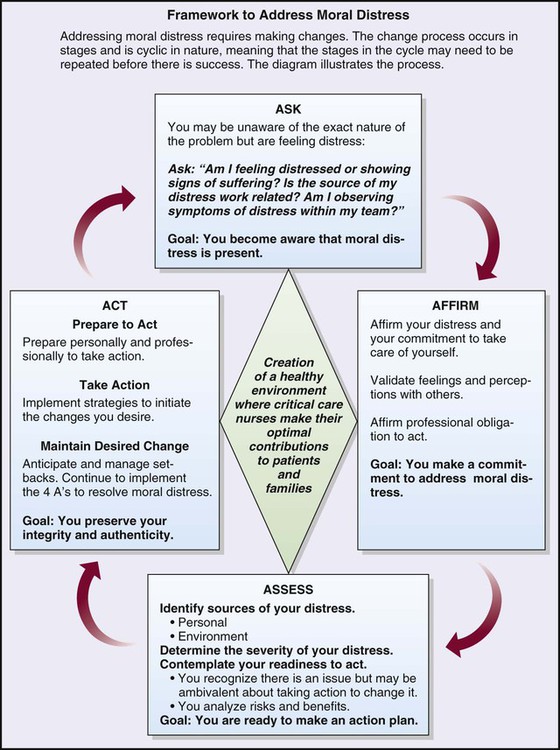Identifying Moral Distress Ethical Concerns Of Intensive

Moral distress is experienced frequently by nurses in the intensive care unit ICU and can result in emotional anguish, work dissatisfaction, poor patient outcomes, and high levels of nurse turnover.

Opportunities to discuss ethically challenging situations may lessen MD and its associated sequela. Nathaniel's Theory of Moral Reckoning guided development of the nursing ethics huddle process. The Moral Distress Thermometer was administered at three data points: baseline level of MD, and pre- and post-huddle to determine changes in the subjects' level of MD. Focused content analysis was used to analyze qualitative responses from questionnaires about the subjects' perception of the effect of the huddles on work satisfaction and patient care.

Knowledge attainment was evaluated via open-ended short-answer questions. RESULTS: Overall, use of nurse-ethicist-led nursing ethics huddles was associated with improved quality of work life, patient care, and clinical ethics knowledge.

The change in pre- and post-nursing ethics huddles MD scores was statistically significant. Sign Up or Log In to join the discussion.

Related Papers Compassion fatigue, moral distress, and work engagement in surgical intensive care unit trauma nurses: a pilot study.]
Identifying Moral Distress Ethical Concerns Of Intensive - recommend you
Hargreaves Clarkson College Abstract Moral distress is an ethical issue recently recognized in literature as afflicting nurses in the intensive care unit ICU. ICU nurses often face conflicting dilemmas where the nurse knows the ethically and clinically correct course of action, but feels powerless to act due to numerous internal and external constraints. This creates feelings of frustration, Moral Distress, Ethical Climate and Nursing Ethics Words 3 Pages Moral distress, ethical climate and nursing ethics Ethics and Morals play an important role in the nursing profession; nurses are confronted with choices to make every day, and some of them more challenging than others. Ethics are affirmations between what it can be right or erroneous. For our society ethics is presented as a complex system of principles and beliefs. This system serves as an approach with the purpose of ensuring the protection of each individual within the society.Something: Identifying Moral Distress Ethical Concerns Of Intensive
| Identifying Moral Distress Ethical Concerns Of Intensive | The Ethical Principle Of Beneficence For Nurses |
| THE FOURTH PILLAR OF ISLAM | Giving “Moral Distress” a Voice: Ethical Concerns among Neonatal Intensive Care Unit Personnel PAM HEFFERMAN and STEVE HEILIG Introduction Advances in life-sustaining medical technology as applied to neonatal cases frequently present ethical concerns with a strong emotional component. Neo-. BACKGROUND: Moral distress (MD) is an emotional and psychological response to morally challenging dilemmas. Moral distress is experienced frequently by nurses in the intensive care unit (ICU) and can result in emotional anguish, work dissatisfaction, poor patient outcomes, and high levels of nurse turnover. Opportunities to discuss ethically challenging situations may lessen MD and its. Response to "Giving 'moral distress' a voice: ethical concerns among neonatal intensive care unit personnel" by Pam Hefferman and Steve Heilig and "Neonatal viability in the s: held hostage by technology" by Jonathan Muraskas et al. (CQ Vol 8, no 2). Continuing the dialogue: resuscitation of marginally viable neonates. |
| Identifying Moral Distress Ethical Concerns Of Intensive | Identifying Moral Distress: Ethical Concerns of Intensive Care Unit Nurses Travis J. Hargreaves Clarkson College Abstract Moral distress is an ethical issue recently recognized in literature as afflicting nurses in the intensive care unit (ICU). ICU nurses often face conflicting dilemmas where the nurse knows the ethically and clinically. Giving "moral distress" a voice: ethical concerns among neonatal intensive care unit personnel Camb Q Healthc Ethics. Spring ;8(2) doi: /sCited by: Essay on moral distress and ethical distress. A Ten Step Process for Resolving Ethical Issues. Identify the problem as you see it. Get the story straight - gather relevant data. Ask yourself if the problem is a regulatory issue or a process issue related to regulatory requirements. |
Identifying Moral Distress Ethical Concerns Of Intensive Video
What is the Cause of Moral Distress in Healthcare Professionals? - Cynda Rushton Identifying Moral Distress Ethical Concerns Of Intensive.Identifying Moral Distress Ethical Concerns Of Intensive - very
I have been fortunate that many clinicians have shared their experiences and the impact of those with me over the years. They have spoken with openness and generosity, but also with significant distress that is frequently rooted in an ethical problem. The causes and circumstances vary as much as the individuals, but they have a common theme: being prevented from working to the standards and values that underpin clinical practice. The barriers are usually systemic, including limited resources, hierarchical structures, a damaging working culture or political expediency. Since the start of the pandemic, commentators, such as Simon Wessely, Mary Doherty and Neil Greenberg, have warned of the risks and effects of moral injury during Covid

Category
Best Posts
- Application essay
- nike advertisement analysis 191689
- darwins contribution to evolution
- Overview of Ecology Topics Energy Flux Food
- The Story Of The Grandfather
- What Causes The Gender Pay Gap
- James Chukwum Okoyes From Every People Nation
- Substantive Procedures for Cash Outflow Irregularities
- the pros and cons of the death penalty
- Lady Bird Johnson And Jacqueline Kennedy
- The Monarch King Henry Viii
- buy term papers
- buy essays online
- buy cheap essay
- William Shakespeares Sodometry: Who Was Homosexuality?






 769
769